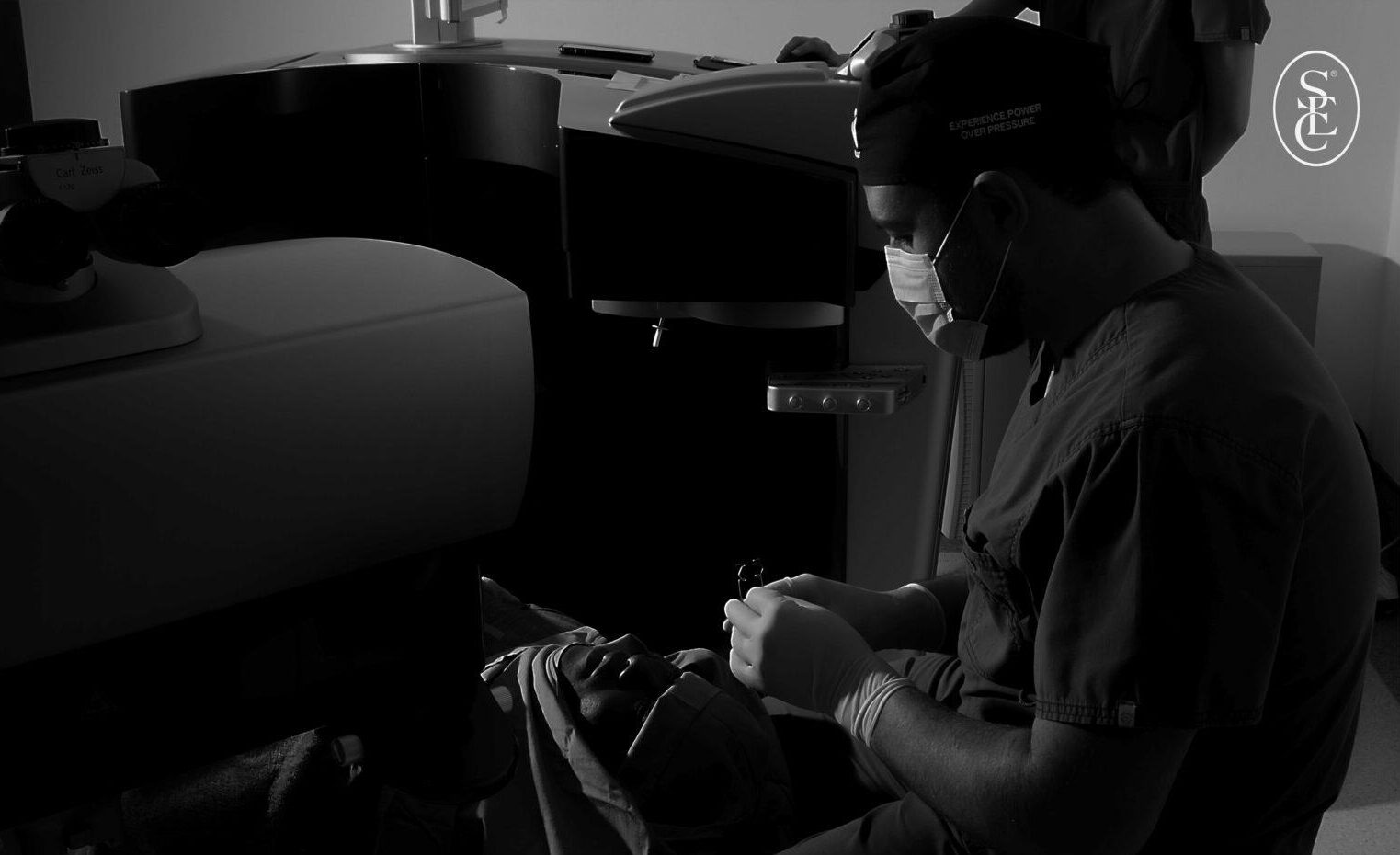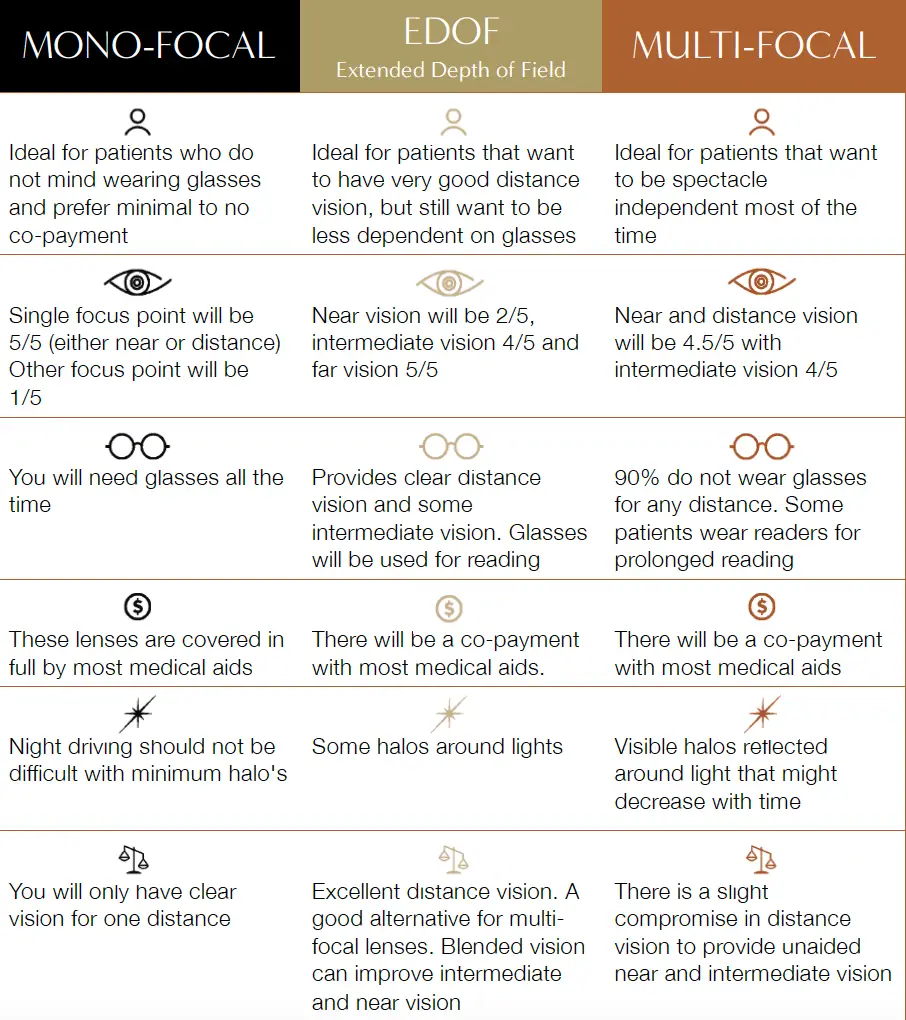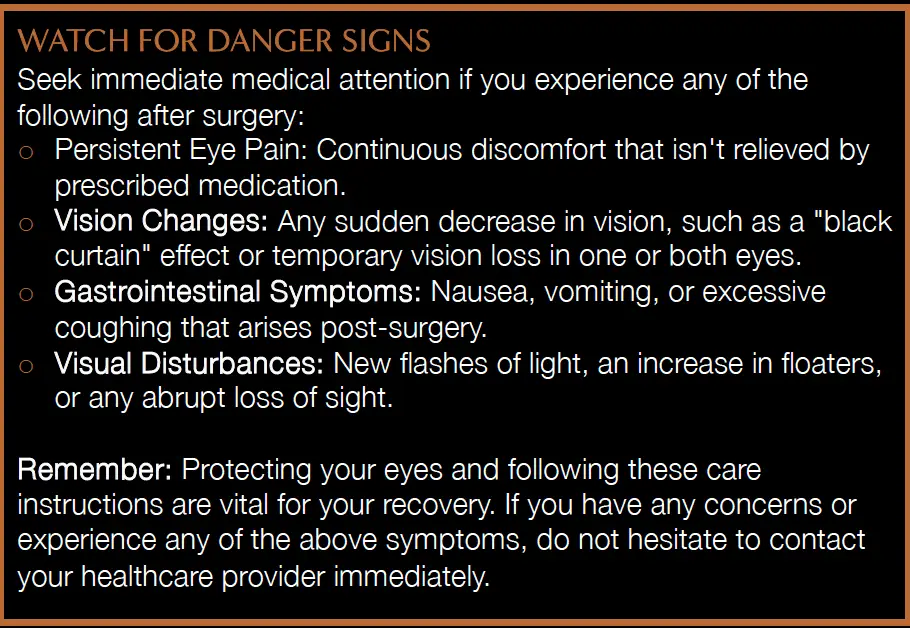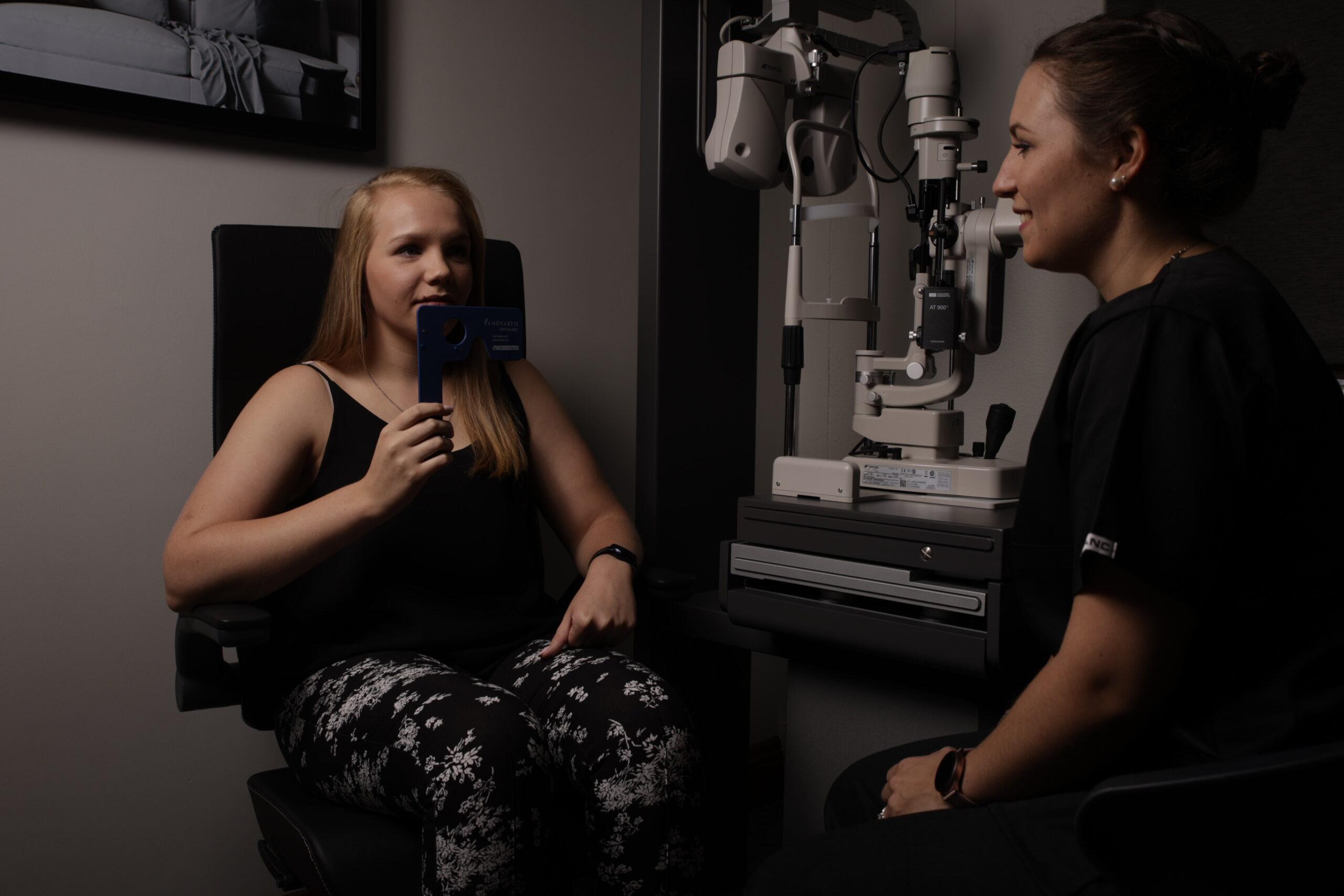Morningside Mediclinic
Cnr of Hill & Rivonia Road, Sandton
011 784 7000
Schedule your appointment
Mon - Fri: 07:30 - 16:30
reception@sandtoneyeclinic.co.za
Cnr of Hill & Rivonia Road, Sandton
Schedule your appointment
reception@sandtoneyeclinic.co.za
Cataract surgery stands out as one of the most reliable and successful procedures performed on an outpatient basis. This brief surgery, lasting merely 15 to 30 minutes, can remarkably transform your life by restoring clear vision.
Embarking on cataract surgery presents you with a unique opportunity to enhance your vision. For individuals leading an active life or those weary of the constant hunt for their glasses, multi-focal lenses offer a liberating solution. The advancements in Refractive Cataract Surgery now open the doors to a life less dependent on, or even free from, glasses. Visualize enjoying crisp, sharp vision during all your waking hours—an investment that enriches the quality of your life.
It’s important to be aware that standard medical insurance plans typically cover the cost of monofocal lenses. Should you choose to embrace a lifestyle unhindered by glasses, opting for multi-focal lenses, be prepared for an additional out-of pocket expense to secure this upgrade in visual freedom.

Cataract surgery ranks among the most precise and successful operations in modern medicine, boasting a remarkable success rate exceeding 98%. It’s a testament to medical advancement that most complications, should they occur, can be managed with effective treatments.
The timing of your cataract surgery is coordinated with several key factors:
•Operating room availability
•Time required for medical aid authorization
•Special lens order and delivery times
•Your personal schedule
Please reserve the entire day for your procedure to accommodate presurgery preparation and post-surgery recovery. Rest assured, you’ll be able
to return home on the same day.
Informed consent is more than a formality; it’s a critical part of your surgical
journey. The concluding section of this booklet contains the consent form,
which affirms that you fully understand the nature of the cataract surgery, its
potential benefits, and associated risks. We encourage you to discuss any
aspect of the surgery with your doctor until you feel confident in your
understanding. You will receive a copy of the consent form for your records.
Our theatre team is committed to facilitating the authorization process with your medical aid. You’ll be kept informed about the status of your authorization and any co-payments through WhatsApp updates. It’s advisable to book your hospital bed promptly to ensure availability. Anticipate an email from your medical aid regarding pre-authorization and co-payments.
One to two days before your scheduled surgery, our team will confirm your authorization status, surgery timing, and location via WhatsApp. You’ll also receive a prescription to be filled at the hospital on your surgery day.
Additionally, we’ll arrange your first post-operative check-up for the following
day. For any inquiries or assistance related to the operation, please reach out
to our theatre team on WhatsApp at +27 72 291 1874.
Fasting: Refrain from eating or drinking after 10:00 PM the night before.
o Diabetes Management: Do not take your insulin or diabetic medications
on the morning of surgery. Instead, bring them with you to the hospital to
take after you’ve had a post-surgery meal.
o Chronic Medications: Continue taking any regular medications with just a
sip of water unless advised otherwise.
o Blood Thinner Adjustments: If you’re on Warfarin, check your INR levels
the day before surgery. A level of 2.5 or below is typically safe. If your
therapeutic range is higher, consult with the doctor managing your
Warfarin in coordination with your ophthalmologist.
o Infections: Any active infections should be fully resolved prior to surgery.
Cataract surgery is usually carried out in a hospital setting under sedation, ensuring you’re comfortable and stress-free throughout the process. In most cases, there’s no need for general anaesthesia, meaning you won’t require intubation and can return home on the same day. To begin, your eye will be fully numbed with local anesthetic drops, ensuring a pain-free experience.
The surgeon then makes minute incisions at the cornea’s periphery using precision instruments like a diamond or sapphire blade. These allow access to the lens without affecting the surrounding structures of the eye.
Utilizing the phacoemulsification technique, the surgeon employs ultrasound vibrations to fragment the cloudy lens, which is then delicately removed by suction. The capsule that originally housed your natural lens is preserved for the placement of the new intraocular lens (IOL).
The IOL is meticulously inserted, often folded, into the capsular bag through the initial incision and then unfurled to its full size, restoring the eye’s focusing ability.
Due to the ‘self-sealing’ nature of the corneal incisions, stitches are generally unnecessary.
Healing and full focus adjustment may take between 6 to 8 weeks post-surgery. If you receive a mono-focal lens, you’ll enjoy clear vision at one set distance and may need glasses for others. On the other hand, a multi-focal lens offers a broader range of clear vision, significantly reducing or even eliminating the need for glasses for most daily activities. As you recover, your eye will heal, and your brain will fine-tune its ability to interpret visual information at various distances.
With our dedicated care and your body’s natural healing, you’ll soon embrace the world with newfound clarity.

After cataract surgery, your vision will begin to improve as you adjust to the new intraocular lens. Recovery rates vary, but most patients attain their sharpest vision within a few weeks. Complete recovery is generally realized by six weeks, at which point you can consult your optometrist for new prescription glasses if you did not choose multi-focal lenses.
You may typically return to your regular routine within 24 hours post-surgery. However, you should avoid strenuous activities and heavy lifting for the initial weeks to ensure proper healing.
Protect your eyes during sleep with the provided eye shield for the first week to prevent accidental contact or injury.
Your ophthalmologist will advise when it’s safe to resume driving, based on your recovery progress and visual acuity
Adhere strictly to the prescribed eye drop regimen to prevent infection and aid in the healing process. If you struggle with the application, seek assistance from someone you trust
Keep your eyes shielded from irritants such as dust and pollen
Resist the urge to rub your eye. If you need to wipe your eye, use a clean tissue and avoid handkerchiefs to minimize infection risk.
Refrain from swimming for at least one month post-surgery to avoid exposing your eyes to potential contaminants
Wait for your doctor’s approval before resuming the use of makeup, typically about two days after your surgery.
There are no safety risks to flying after cataract surgery. Air travel can dry out your eyes, pack your drops in the carry-on luggage
Immediately After Surgery: You’ll be given a prescription for eye drops and instructions on how to use them. Arrange for transportation home and plan for some quiet time to rest. An eye shield will be placed over your operated eye. Do not remove the eye shield. If cataract surgery is performed on only one eye at a time, you may note an imbalance in your vision until the second eye is operated.
o First Days Post-Surgery: It’s normal to feel itching or mild discomfort as your eye heals. It’s also important to protect your eyes from bright lights by wearing UV-protected sunglasses outdoors. Vision should improve within 10-14 days after your procedure.
o Weeks Following Surgery: The recovery trajectory varies, but six weeks is the average period for healing. Vision adjustments may continue over several months, with the most significant changes occurring within the first three to six months.
Remember, each eye and patient’s response to surgery is unique, so your experience may differ slightly. Always follow the specific instructions provided by your ophthalmologist to ensure the best possible results from your surgery.

